A virus doesn’t travel, but people do. Despite a year of warnings, lockdowns, public health measures, kind appeals to the better angels of our nature, the less-kind threats of hefty fines…people travel.
At Christmas in particular, it seems the promised joy of a weekend at the cabin, or a family gathering, or a weekend skiing just outweighed the risk.
On Christmas week, there was one case of COVID-19 in 100 Mile House, one in the surrounding South Cariboo region that I call home, and none in the Cariboo-Chilcotin area that includes Williams Lake and two in Quesnel.
The most recent case map from the B.C. Centre for Disease Control shows 140 cases in the Cariboo-Chilcotin and 24 in 100 Mile House as of January 16, though I’m told there are now 59 confirmed cases in Tsq’escen, the Secwepemc community near 100 Mile House. The Williams Lake First Nation says 34 community members have been confirmed with the virus.
It will get worse before vaccines stand any chance of making it better.
An outbreak has been declared and this week a rapid response paramedic team was sent to Williams Lake.
Per 100,000, that’s a fast-moving virus. And, sadly, such a predictable one.
Alberta, Manitoba, and Ontario are also coping with a surge in rural communities. In the U.S., states like Wyoming, Nebraska, Minnesota, Iowa and Montana are the new hot spots for COVID spread.
It will get worse before vaccines stand any chance of making it better.
Rural B.C. communities have a demographic challenge. Residents are older, face more health challenges and have fewer health care resources. In other words, rural communities are made up predominantly of the people most likely to die or suffer the worst from the virus. It’s a recipe for disaster.
Half of the COVID cases in this region are in First Nations communities. When an elder passes, and already some have, these communities lose an invaluable human library of language and cultural knowledge.
The federal government has prioritized vaccines for First Nations communities. That’s a start. If only they had prioritized adequate housing, food security, clean water, equal economic opportunity, and proper infrastructure.
It must be particularly frightening for the Secwepemc, whose territory encompassed the Cariboo Gold Rush. In 1861 there were 32 Secwepemc communities throughout a vast territory that straddled the Fraser River, stretching east to the Rocky Mountains. By the time the 1862-1863 smallpox epidemic was over, thousands had died. Today there are 17 surviving Secwepemc communities.
When forestry and mining and fishing have taken downturns in B.C.-beyond-the-604, the province invested heavily in the tourism sector. Many of those business will not survive.
Most rural communities were already facing economic challenges with downturns in natural resource development. They have fewer social support programs. People will go to work feeling sick. They feel they have to. There are no sick days for farmers, logging contractors, or self-employed business people.
The economic impact of closures will be felt acutely in rural B.C., where businesses rely on much smaller margins than in urban centres. Many will close their doors permanently, most of them the sole provider of their service in these communities.
When forestry and mining and fishing have taken downturns in B.C.-beyond-the-604, the province invested heavily in the tourism sector. Many of those business will not survive.
Many urban residents with summer homes or family in rural areas fled to what they viewed as safe havens during the first wave of the pandemic. In no small part because of that, they no longer are.
Stay home.
Things here are going to get much worse before they get better.
Dene Moore is an award-winning journalist and writer. A news editor and reporter for The Canadian Press news agency for 16 years, Moore is now a freelance journalist living in the South Cariboo. Moore’s two decades in daily journalism took her as far afield as Kandahar as a war correspondent and the Innu communities of Labrador. She has worked in newsrooms in Vancouver, Montreal, Regina, Saskatoon, St. John’s and Edmonton. She has been published in the Globe and Mail, Maclean’s magazine, the New York Times and the Toronto Star, among others. She is a Habs fan and believes this is the year.
SWIM ON:
- Dene Moore last looked at the riots and incandescent idiocy in Washington, DC and wondered: is Canada really immune to this crap?
- Daniel Marshall looked back at BC's first major urban/rural split. The spoiler here is this isn't exactly a new phenomenon.
- Is the Speculation Tax working? Rob Shaw says it depends who you ask.



